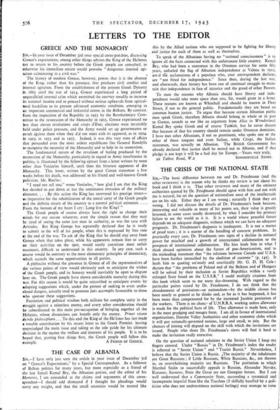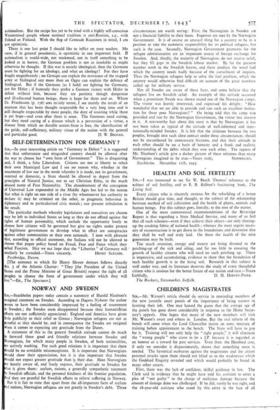THE CRISIS OF THE NATIONAL STATE
SIR,—The basic difference between me and Dr. Friedmann (and the other reviewers) is the reason why he thinks my review is not about his book and I think it is. That other reviewers and many of the eminent authorities quoted by Dr. Friedmann should agree with him and not with me is natural, for on the question of nationalism most of the intellectuals are on his side. Either they or I am wrong ; naturally I think they are wrong. I did not discuss the details of Dr. Friedmann's book because, interesting and valuable as many of his points are, their value is greatly lessened, in some cases totally destroyed, by what I consider his primary failure to see the world as it is. It is a world whose peaceful future depends on an adequate diagnosis, without which we can have no adequate prognosis. Dr. Friedmann's diagnosis is inadequate. It is not a matter of proof texts ; it is a matter of the handling of concrete problems. In practically every case, Dr. Friedmann sees signs of a decline in national power for mischief and a growth of international collaboration or the prospects of international collaboration. His bias leads him to• what I think absurd optimism about the future of pan-Americanism, and to the misleading statement that "the relations between Canada and U.S.A. have been further intensified by the abolition of customs" (p. 145). It leads him to quoting seriously and uncritically Mr. G. D. H. Cole dictum that "the problems of Poland and of the Balkans and of Hungary will be solved by their inclusion as Soviet Republics within a vastly enlarged State based on the U.S.S.R." I could multiply citations from this book which seem to me mere day-dreaming. With regard to the particular points raised by Dr. Friedmann, I do not think that the abandonment of patriotism—or nationalism—by the middle classes has been nearly as general as he thinks and, as far as it has happened, it has been more than compensated for by the increased Jacobin patriotism of the workers. There is no chanc- of U.N.R.R.A. working unless allowance is made for the political facts of life. That allowance is made here, only in the most grudging and meagre form. I am all in favour of international organisations, Danube Valley Authorities and other economic clubs which it will pay rationally-governed nations, large and small, to join. But the chances of joining will depend on the skill with which the invitations are issued. People who share Dr. Friedmann's views will find it hard to make the invitation really attractive.
On the question of national solutions in the Soviet Union I keep my fingers crossed. Under " Russia " in Dr. Friedmann's index the reader is referred to "Soviet Union" and "Tsarist Russia." Nevertheless, I believe that the Soviet Union is Russia. ,The majority of the inhabitants are Great Russians ; if Little Russians, White Russians, &c., are thrown in, an overwhelming majority are Russians. The patriotism to which Marshal Stalin so successfully appeals is Russian, Alexander Nevsky, Kutusov, Suvorov, Peter the Great are not Georgian heroes. But I can well understand that a Communist State, succeeding a tyrannical and incompetent imperial State like the Tsardom (if skilfully handed by a poli- tician who does not underestimate national feelings) may manage to tame nationalism. But the recipe has yet to be tried with a highly self-conscious Westernised people whose national tradition is anti-Russian, e.g., with Poland or Finland. With the flop of Comrade Kuusinen in mind, I am not optimistic.
There is one last point I should like to inflict on your readers. My view, if in general pessimistic, is optimistic in one important field. If pationalisth is world-wide, not Weakened, not in itself something to be looked at in horror, the German problem is not as insoluble as might otherwise be thought. If this war is mainly ideological, then the Germans must be fighting for an ideology, and what an ideology! For they have fought magnificently ; no Gestapo can explain the resistance of the trapped army at Stalingrad any more than an Ogpu can explain the defence of Stalingrad. But if the Germans (as I hold) are fighting for Germany, not for Hitler ; if humanly they prefer a German victory with Hitler to defeat without him, because they are patriotic though dangerous and ill-educated human beings, there is hope for them and us. Where Dr. Friedmann (p. 156) sees msinly terror, I see mainly the result of an emotion that has been thought respectable for a very long time and is still thought respectable by most people, the duty of resisting while there Is yet hope—and even after there is none. The Germans need curing, but they need curing of a disease which is a perversion of a virtue, a disease from which no durable nation-State is free, .the identification of the pride, self-sufficiency, military virtue of the nation with the general



























 Previous page
Previous page